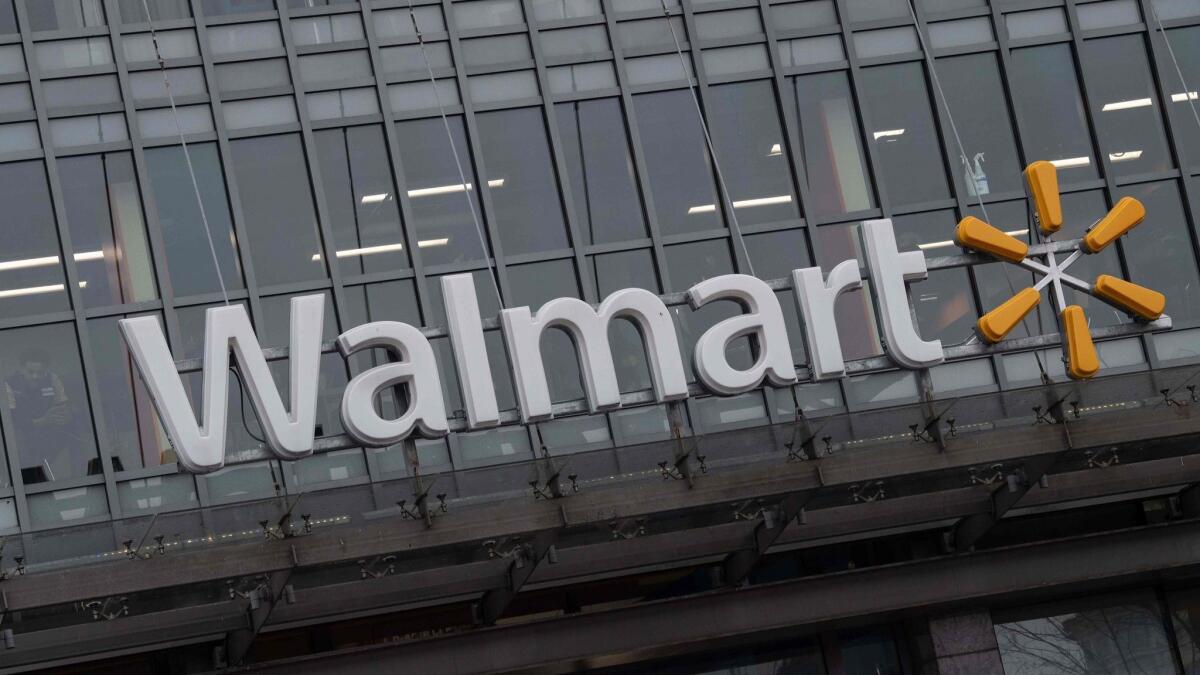Walmart will pay $282 million in penalties to resolve 7-year probe into foreign bribes

- Share via
Walmart Inc. ended a seven-year investigation by the U.S. government over payments made to fast-track store openings in several countries by agreeing to pay more than $282 million in penalties. Its Brazilian unit admitted to violating a federal anti-bribery law.
In parallel announcements Thursday, the Justice Department and the Securities and Exchange Commission faulted the country’s largest retailer for not having controls in place to vet third-party companies it worked with to open stores in Mexico, China, Brazil and India. Walmart will pay about $138 million in criminal penalties and $144 million in disgorgement to resolve the SEC’s allegations.
WMT Brasilia pleaded guilty Thursday to failing to keep accurate records, while the U.S. parent reached a non-prosecution agreement with the Justice Department over violations of the Foreign Corrupt Practices Act, or FCPA. The company will have a compliance monitor for two years as part of that accord.
“Walmart is committed to doing business the right way, and that means acting ethically everywhere we operate,” Walmart President and CEO Doug McMillon said in a statement. “We’ve enhanced our policies, procedures and systems and invested tremendous resources globally into ethics and compliance, and now have a strong Global Anti-Corruption Compliance Program.”
The resolution, disclosed in court filings in Virginia and press releases, was a muted end to what was once seen as one of the largest foreign bribery cases launched by the U.S. While the penalty is about one-sixth of the $1.78 billion levied against Petroleo Brasiliero SA in one of South America’s biggest corruption scandals, Walmart wound up spending about $1 billion in legal fees and other costs related to the investigation.
Justice Department and SEC officials said Walmart didn’t take necessary steps to avoid corruption.
“Walmart valued international growth and cost-cutting over compliance,” said Charles Cain, chief of the SEC unit that enforces the FCPA. “The company could have avoided many of these problems, but instead Walmart repeatedly failed to take red flags seriously and delayed the implementation of appropriate internal accounting controls.”
Walmart disclosed possible violations in Mexico to the Justice Department and SEC in November 2011. The following year, the New York Times outlined details of allegations that the retailer paid some $24 million to Mexican officials to win quick zoning changes, sidestep licenses and environmental permits and deflect opposition to open stores, turning Walmart into that country’s largest private-sector employer.
The Times article set off a resurgence of foreign bribery investigations, which had begun to accumulate court losses and gain corporate enemies who were pushing Congress to rein in prosecutors.
But the Walmart case posed challenges for investigators. Much of the conduct uncovered in Mexico, for example, couldn’t be used as evidence because it was too old, according to the people familiar with the matter. So the government sought to build stronger cases in other countries. In Brazil and India, investigators found more recent examples of what they believed were improper payments, yet struggled to find examples of rampant misconduct in China, the people said.
In the closing days of the Obama administration, Walmart balked at demands to pay more than $600 million in penalties, leading prosecutors to go back to gather more evidence from witnesses, people familiar with the matter told Bloomberg at the time.
In 2017, the company set aside almost $300 million for a possible settlement, after which the sides deadlocked over what misconduct the retail giant would admit to, a person familiar with the matter previously said.
On Thursday, Walmart’s Brazilian unit admitted that $527,000 in improper payments to an intermediary were inaccurately recorded on financial records. Walmart Brazil employees logged those payments as going to construction companies when they knew the money was going to a former Brazilian government official, according to the plea agreement filed in Virginia. The former official helped Walmart win a construction permit. Walmart earned more than $3.6 million in profit from stores built by these construction companies.
More to Read
Inside the business of entertainment
The Wide Shot brings you news, analysis and insights on everything from streaming wars to production — and what it all means for the future.
You may occasionally receive promotional content from the Los Angeles Times.










